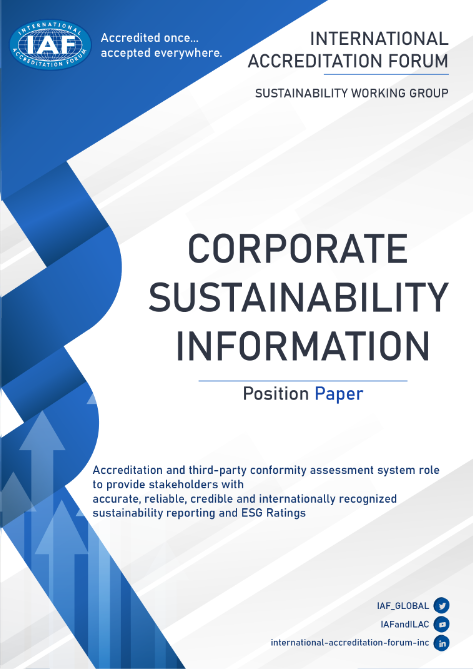Elena Battellino
Technical Officer
L’Ente Italiano di Accreditamento (Accredia)
The market’s demand for information on organisations according to parameters that are not only financial has gradually intensified since the 1990s.
An environmental, social and governance (ESG) rating, namely a synthetic opinion that defines the level of performance from the point of view of ESG aspects, increases the information available on the organisation and can therefore improve stakeholders’ evaluations and choices towards it.

ESG, which has also evolved through the international reporting standards[1], the Organisation for Economic Co-operation and Development (OECD) guidelines[2], and Sustainable Development Goals of the United Nations 2030 Agenda[3], is now acquiring great relevance in the framework that is gradually emerging in different regions of the world.
Several studies are currently underway to identify a common policy line for ESG rating in the financial economic sector, such as “Environmental, Social and Governance (ESG) Ratings and Data Products Providers” published by the International Organization of Securities Commissions (IOSCO)[4], “The Environmental, Social and Governance (ESG) Strategy for Hong Kong” [5] published by the Financial Services Development Council of Hong Kong, and the “Proposal for a Regulation of the European Parliament and of the Council on the transparency and integrity of Environmental, Social and Governance (ESG) rating activities”[6].
The lack of shared rules creates misalignments, as indicated by the recent Proposal for a European Regulation: “However, the current ESG rating market suffers from deficiencies and is not functioning properly, with investors and rated entities’ needs regarding ESG ratings are not being met and confidence in ratings is being undermined. This problem has a number of different facets, mainly (i) the lack of transparency on the characteristics of ESG ratings, their methodologies and their data sources and (ii) the lack of clarity on how ESG rating providers operate. ESG ratings do not sufficiently enable users, investors and rated entities to take informed decisions as regards ESG-related risks, impacts and opportunities.”[7]

As noted in the “Position Paper on Corporate Sustainability Information” published by IAF in July 2023[8] , independent and accredited third-party evaluation according to ISO/IEC 17029 Conformity assessment — General principles and requirements for validation and verification bodies can help to overcome reported misalignments and to ensure reliability in ESG ratings in the voluntary sector.
The ESG ratings can be considered ethical claims according to ISO/IEC 17029. The reference to the accreditation standard provides organizations and stakeholders with common terminology, standardized requirements for preparing the claim about ESG rating and clear explanation of a means to verify/validate the ESG ratings.
In addition, ISO/IEC 17029 contains general principles and requirements for the competence, consistent operation and impartiality of bodies performing validation/verification of the ESG ratings, guaranteeing reliability in the statements issued by the conformity assessment body (CAB).
Verification and validation processes designed and implemented according to a programme prepared according to Annex A of ISO/IEC 17029 provide stakeholders with confidence regarding a standardized and verifiable process as well as the reliability and reproducibility of evaluation conclusions.
The third-party evaluation for accreditation purposes of a verification/validation programme ensures mutual recognition of conformity assessment results at the international level. The clear segregation of responsibilities and duties among scheme owner, accreditation body, CABs and programme operator enables avoidance of conflicts of interest.
The need for an integrated and systematic verification/validation process referring to ISO/IEC 17029 and based on a combination of remote activity and on-site visits enables the mitigation of risks of misstatements and opportunities for cross-checking different type of evidence (documents, records, interviews, observations, claims, etc.), increasing the quality of information used by the organization to set ESG objectives and plans aiming to mitigate the exposure level to ESG risks and impacts.
Lastly, the accreditation provides stakeholders with confidence of conformity assessment bodies’ compliance with international standards and programs and ensures mutual recognitions of ESG ratings supporting cost efficiency, by avoiding duplication of assessments.
Therefore, CABs accredited according to ISO/IEC 17029 and a programme with the scope of verifying/validating an ESG rating can provide stakeholders with higher confidence in the competence, impartiality, confidentiality, and above all, credibility of conformity assessment activities.
[1] For example, Global Reporting Initiative (GRI), International Integrated Reporting Council (IIRC), Sustainability Accounting Standards Board (SASB).
[2] https://www.oecd-ilibrary.org/finance-and-investment/oecd-guidelines-for-multinational-enterprises-on-responsible-business-conduct_81f92357-en;jsessionid=ZI-tKL16cL71QX2VIIW2JQBrMqgIraNF6kfJwv4q.ip-10-240-5-8
[4] https://www.iosco.org/library/pubdocs/pdf/IOSCOPD690.pdf
[5] https://www.fsdc.org.hk/en/insights/environmental-social-and-governance-esg-strategy-for-hong-kong/
[6] https://eur-lex.europa.eu/legal-content/IT/TXT/?uri=CELEX:52023PC0314R(01)
[7] https://eur-lex.europa.eu/legal-content/EN/TXT/HTML/?uri=CELEX:52023PC0314
[8] https://iaf.nu/en/iafbrochures/
Categories: IAF Members' news